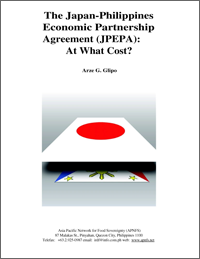The Japan-Philippines Economic Partnership Agreement (JPEPA): At What Cost?

The Japan-Philippine Economic Partnership Agreement (JPEPA) signed several months agoby the heads of states of both countries needs to be ratified by the Philippine Senate beforeit can be fully enforced and implemented. Shrouded in secrecy during its negotiations, theagreement is now being foisted upon the Filipino people as a new-age free trade treaty thatwill usher in tremendous economic benefits for the country, expanding market access forPhilippine agriculture exports, allowing Filipino nurses and caregivers gainful employmentin Japan and boosting the flow of foreign direct investments in the country.But like other post-WTO free trade agreements, JPEPA is a comprehensive bilateral freetrade agreement that includes not only trade in goods and services but also areas likeinvestments, competition, and government procurement –the so-called new issues in theWTO that have been excluded from the Doha Round of negotiations because of their verysensitive nature. The proliferation of such agreements is seen as an alternative track fordeveloped countries to maintain and expand their economic and trade interests in thedeveloping world, in the wake of the collapse of the multilateral trade negotiations.
